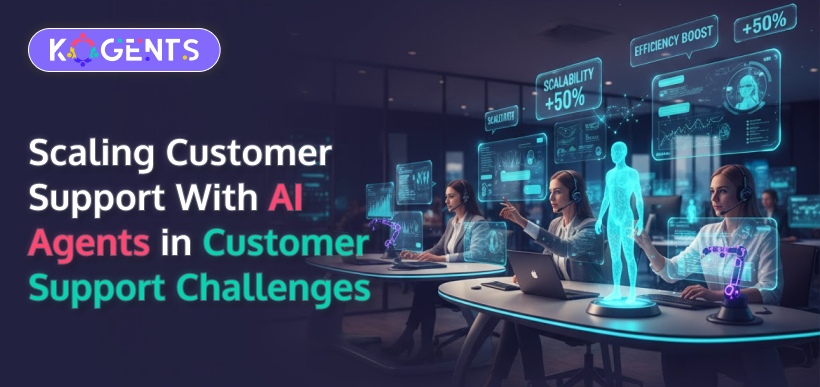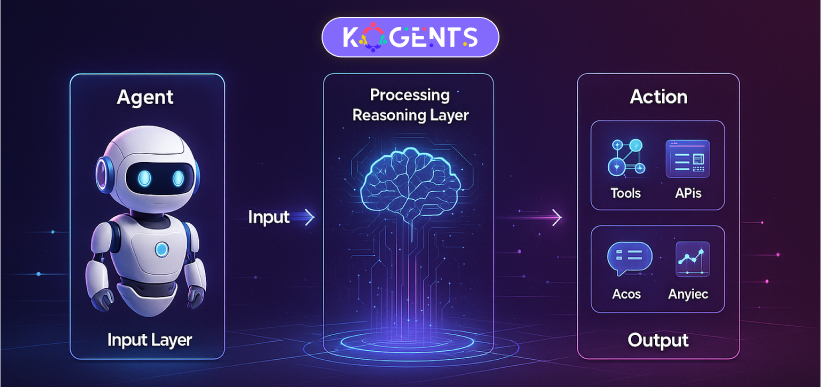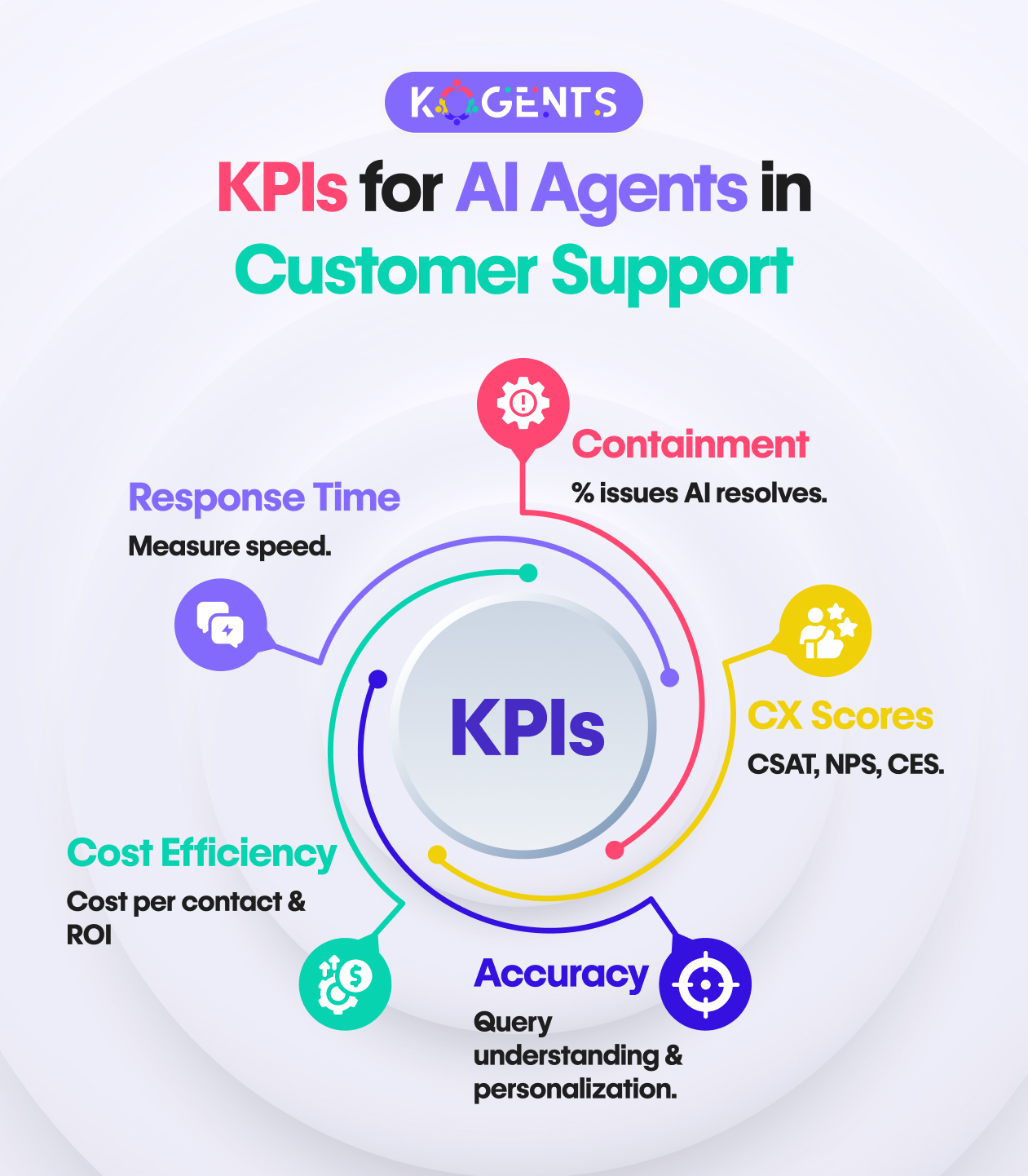Scaling Customer Support With AI Agents in Customer Support Challenges

Summary:
Ever imagined how scaling your customer support operations without sacrificing quality or personalization in every interaction would be done?
With the rise of AI-powered support agents, this is possible as routine tasks can now be automated, giving human teams the freedom to focus on complex issues and deliver optimum results.
Additionally, delivering outstanding customer experience has become a paramount factor for business growth and long-term loyalty.
Yet, traditional methods often fall short, bogged down by repetitive work and slow response times.
This is where AI agents in customer support challenges make a real difference, helping businesses improve efficiency, resolve queries faster, and stay ahead in a demanding market.
Key Takeaways
- Understand the current state of customer support and its challenges.
- Learn about the different types of AI agents that can support your customers.
- Discover effective strategies for implementing AI agents in your customer support operations.
- Explore real-world success stories of businesses that have transformed their customer support with AI agents.
- Gain insights into maintaining quality and personalization in customer interactions with AI agents.
What Is the Role of AI Agents in Customer Support
Challenges
As you explore the potential of AI in customer support, it’s essential to understand the role of AI agents.
AI agents function like employees with specific skill sets, leveraging knowledge about an organization’s products, customers, and people to autonomously complete tasks and save humans time.
What Are AI Agents and How Do They Work?
Customer service AI agents are designed to effectively understand and respond to customer inquiries. They use advanced natural language processing to comprehend customer queries in context, regardless of how they’re phrased.
This ability allows AI agents to provide personalized responses based on customer history, enhancing the overall customer experience.
A Technological Leap: From Basic Chatbots to Intelligent AI Agents
This growth has been significant, moving from simple chatbots that relied on keyword matching to sophisticated agents that can understand nuanced requests and detect sentiment.
Modern AI agents can maintain conversation context and remember previous interactions, providing a more human-like experience, though AI support agent limitations still exist in areas such as empathy and complex problem-solving.
Studies such as the Harvard Business School research emphasize that while AI systems can mimic empathy, customers still strongly value genuine human connection.
Key Impact: It represents a fundamental shift from programmed responses to intelligent conversation management.
| Feature | Basic Chatbots | Intelligent AI Agents |
| Understanding Customer Queries | Rely on keyword matching | Use advanced natural language processing. |
| Response Capability | Limited to predetermined scripts | Can provide personalized responses based on customer history. |
| Conversation Management | Programmed responses | Intelligent conversation management |
What Types of AI Agents Are Reshaping Customer Support
Customer support is being redefined by the introduction of various AI agents that cater to different business needs.
These AI-powered solutions are designed to:
- Customer experience
- Improve operational efficiency,
- Provide valuable insights to businesses.
Autonomous Agents Or Independent Problem Solvers?
They are AI-driven systems that can independently resolve customer issues without human intervention.
These agents use advanced algorithms to understand customer queries and provide accurate solutions.
By leveraging natural language processing (NLP), autonomous agents can effectively address a wide range of customer concerns, reducing the workload on human support teams and enabling them to focus on more complex issues.
Augmented Agents: AI Copilots for Human Support Teams
They serve as AI copilots for human support teams, enhancing their capabilities and improving response times.
Key point: These agents provide real-time suggestions and insights to support agents, enabling them to resolve customer issues more efficiently.
By analyzing customer interaction data, augmented agents can identify common issues and offer proactive solutions, thereby improving customer satisfaction.
Analyst Agents: Turn Data into Actionable Insights
They specialize in data analysis, deriving actionable business insights from vast amounts of customer interaction data.
These AI agents in customer support challenges can monitor sentiment in customer conversations, proactively alert teams about potential SLA breaches, and provide valuable insights with simple natural language prompts.
Some key benefits of analyst agents include:
- Processing vast amounts of customer interaction data to identify patterns, trends, and insights that would be impossible to detect manually.
- Performing sentiment analysis across customer conversations to gauge satisfaction levels and identify potential churn risks.
- Automatically categorizing and clustering similar customer issues, helping your team identify common problems that need product or process improvements.
- Transforming raw support data into actionable business intelligence, enabling data-driven decision-making across your organization.
Soft Reminder: The integration of data from an organization’s existing tech stack, analyst agents offer a comprehensive Customer360, enabling businesses to make informed decisions and generate reports in seconds using natural language queries.

Key Benefits of Implementing AI Agents
The integration of AI agents into customer support operations brings significant advantages, transforming the way businesses interact with their customers.
Enhancing Efficiency and Response Times
AI agents significantly enhance the efficiency of customer support operations by providing immediate responses to customer inquiries.
This reduces wait times, allowing your customers to get the help they need quickly.
With AI handling initial inquiries, your human support team can focus on more complex issues, thereby improving overall response times and enhancing the customer experience.
Reducing Operational Costs
- Implementing AI agents can lead to substantial cost savings for your business.
- By automating routine support tasks, you can reduce the workload on your human support agents, allowing you to allocate resources more effectively.
Cost Saving Tip: This cost-effective approach to customer support enables you to maintain high service levels while minimizing operational expenses.
Improving Customer Satisfaction and Loyalty
AI agents contribute to improved customer satisfaction by offering 24/7 support availability, consistent information, and personalized experiences.
Customers appreciate the immediate responses and the ability to get help on their schedule.
Moreover, AI agents can identify potential issues before they become major problems, demonstrating your commitment to customer success.
This proactive approach not only enhances customer satisfaction but also fosters customer loyalty, leading to higher retention rates and increased customer lifetime value.
- Customers benefit from immediate responses and reduced wait times, improving overall satisfaction.
- The consistency of information provided by AI agents builds trust in your service quality.
- Personalized experiences, thanks to AI remembering past interactions, make customers feel valued.
- Proactive support identifies potential issues before they escalate, demonstrating your commitment to customer success.
Navigate Implementation Challenges
As you integrate AI into your customer support operations, you’ll need to address several key implementation challenges.
The successful deployment of AI agents can significantly enhance your customer support capabilities, but it requires careful planning and execution.
Balancing Automation with the Human Touch
One of the primary challenges is striking the right balance between automation and human interaction, as automation issues in customer service often arise when systems replace empathy with efficiency.
- While AI can efficiently handle routine inquiries, complex issues often require a human touch.
- Ensuring that your AI system can seamlessly escalate issues to human representatives when necessary is crucial.
Pro-Pro Tip: Balance is key to maintaining high levels of customer satisfaction while leveraging the efficiency of AI.
Data Security and Privacy Concerns
They are significant concerns when implementing AI agents. These systems often require access to sensitive customer data to function effectively.
Compliance with U.S. frameworks such as the CCPA and the NIST AI Risk Management Framework is critical to maintaining trust and ensuring responsible AI deployment.
- Soft Reminders: Implementing robust security measures to protect this data is essential.
- Ensure compliance with relevant data protection regulations, such as GDPR or CCPA, depending on your region and customer base.
Technical Integration with Existing Systems
Integrating AI agents with your existing CRM, ticketing systems, and knowledge bases requires careful planning and technical expertise.
API compatibility and data standardization across platforms are critical challenges that must be addressed during implementation.
You may need to evaluate whether to build custom integrations or use middleware solutions that connect AI capabilities with existing infrastructure.
To overcome these technical hurdles, consider;
- leveraging API-based integrations
- and middleware solutions that facilitate seamless data exchange between systems.
Best Practices for AI Agent Deployment
The AI-agent integration in customer service hinges on a well-planned strategy that considers both customer needs and operational requirements.
To ensure the effective integration of AI into customer support, several best practices should be adopted.
Creating a Comprehensive Implementation Strategy
Developing a comprehensive implementation strategy is crucial for the successful deployment of AI agents, especially when implementing AI support agents in the U.S.
This involves establishing clear objectives, defining the scope of AI deployment, and identifying key performance indicators (KPIs) to measure success.
By doing so, you can ensure that AI agents are aligned with your customer support goals and that their impact is accurately assessed.
Training Your Team to Work Alongside AI
To maximize the benefits of AI agents, it’s essential to train your support team to work effectively alongside them.
This includes providing training on AI capabilities, understanding AI-driven insights, and learning how to seamlessly hand off customer issues between AI and human agents.
Measuring Success and Continuous Improvement
Assessing the success of AI agents requires a data-driven approach. Key metrics to evaluate include accuracy, resolution rates, and customer satisfaction scores. To continuously improve AI performance, you should:
- Establish comprehensive metrics that measure both operational efficiency and customer experience.
- Implement regular review cycles to analyze AI performance data and identify areas for improvement.
- Create feedback loops that incorporate input from customers and support agents to refine AI capabilities.
- Monitor containment rates and successful handoffs to human agents.
- Use A/B testing to evaluate different AI approaches and determine the best strategies for your service AI agent base.

Real-World Success Scenario
A notable company implemented AI copilots to assist their 500+ support agents, resulting in a 42% increase in first-contact resolution rates.
Large-scale deployments are evident in enterprises like Salesforce, where its AI platform Agentforce has demonstrated how copilots can enhance agent efficiency and customer satisfaction at scale.
This not only enhanced agent productivity but also improved customer satisfaction by 18% as agents could focus on building rapport while the AI handled information retrieval and procedural guidance.
- A telecommunications provider saw a 42% increase in first-contact resolution rates after deploying AI copilots to assist their support agents.
- Their augmented agents now handle 30% more customer inquiries per day, reporting higher job satisfaction due to reduced repetitive tasks.
- The AI copilot provides real-time guidance, leveraging customer history to suggest solutions and mitigate conversational AI challenges in support.
Redefine Customer Experience with AI Agents in Support Challenges!
As AI evolves, the future of customer support is set for a major transformation. AI agents in customer support challenges will become more widespread, helping businesses deliver exceptional experiences.
With advances in natural language processing, they’ll handle complex inquiries with near-human understanding, while sentiment analysis and emotion recognition will enable empathetic, adaptive responses.
Support ecosystems will shift toward human-AI collaboration, blending efficiency with empathy.
By leveraging customer data, AI agents will drive personalized support at scale. Hence, redefine your business to connect with customers by having Kogent AI by your side. Call us at (267) 248-9454 or email us at info@portal.kogents.ai before it’s too late!
FAQs
What are the primary benefits of integrating AI into customer service AI agent operations?
Integrating AI into customer service operations can significantly enhance efficiency and response times, reduce operational costs, and improve overall customer satisfaction and loyalty.
How do AI agents handle complex customer issues?
AI agents are designed to handle a range of customer issues, from simple queries to more complex problems, by leveraging natural language processing and sentiment analysis to provide accurate and empathetic responses.
Can AI agents replace human customer support agents entirely?
While AI agents can automate many tasks and provide 24/7 support, human customer support agents are still essential for handling complex issues that require a human touch and empathy, making Hybrid human-AI workflows often the most effective.
What are some common concerns when implementing AI agents in customer support?
Common concerns include data security and privacy, ensuring a balance between automation and human interaction, and Integration with legacy systems and processes.
How can businesses measure the success of AI agent deployment in customer support?
Businesses can measure success by tracking key performance indicators such as response times, customer satisfaction ratings, and operational cost savings, and continually refining their AI strategy based on these insights.
What is the role of human agents when AI is introduced to customer support?
Human agents focus on complex issues that require empathy in AI and a human touch, while AI agents handle more routine tasks, allowing human agents to provide more personalized and effective support.
What challenges do AI agents face in U.S. customer support?
AI agents often struggle with personalization, complex queries, and integration with legacy systems, making What challenges do AI agents face in U.S. customer support? A key consideration for businesses.
What are the limitations of AI chatbots in American support services?
Chatbots may lack empathy, context understanding, and explainability, highlighting the relevance of the Limitations of AI chatbots in American support services.
Are there examples of AI agent failures in U.S. support systems?
Yes, cases like the Social Security Administration’s AI rollout illustrate real-world challenges, answering the Case study of AI agent failures in U.S. support.
Which AI customer support tools can help overcome integration issues in the U.S.?
Platforms with advanced APIs and legacy system compatibility address common bottlenecks, relevant to Best AI customer support tools to overcome integration issues U.S.
How do AI customer support platforms ensure compliance with U.S. regulations?
Tools that follow frameworks like California Consumer Privacy Act (CCPA) and Explainable AI (XAI) maintain Data privacy (CCPA, GDPR) and AI transparency, reflecting searches like AI customer support platforms with compliance features.

Kogents AI builds intelligent agents for healthcare, education, and enterprises, delivering secure, scalable solutions that streamline workflows and boost efficiency.